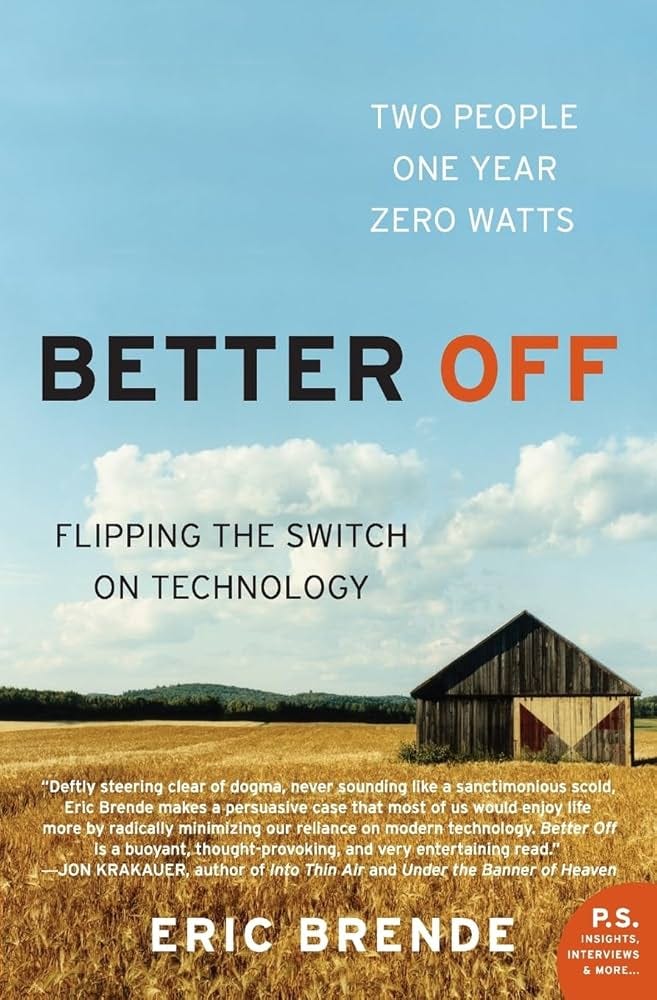A Morning in Anywhereville
Daylight ascends on the quaint little suburb. Seven inches of snow put a white sheet over the neighborhood and municipal trucks just finished plowing the winding concrete roads. Carl Smith gets out the snowblower for the first time this year. His wife Jane wrestles to ready the kids for school. She has four children, 5, 7, 11, and 14. This is the first year she has an empty house on school days, and it’s taking some getting used to. With a daily tinge of nostalgia, she remembers the previous exhausting years of keeping those toddlers from killing themselves on a daily basis as they scramble out the door. Her neighbor Paula, just married a couple years ago, is in that stage now with 2 under 3 years old.
Those days are behind, and she has a long batch of orders to fulfill today, and no time to waste. Carl just finishes clearing the driveway as the kids walk past him. He kisses Jane’s cold cheeks goodbye as trails her children to school.
The kids aren’t going to a normal school though. She’s going to Kate Black’s house, three blocks away. She established a school “pod” some years back with her retired teacher friends. They would be in the house with twelve other kids, all separated by skill level. A decade ago, the state rescinded the requirement for teacher certifications and allowed anyone to receive an eight-thousand-dollar voucher per year to teach, granted they could show student improvement and prove daily attendance. No more frustrating drives to drop the kids off, no more worrying about teachers she didn’t know, and no more navigating the infuriating bureaucracy of standard schools. Jane knew and trusted Kate. Her kids would be in good hands.
Jane quickly chats with Kate and huffs home to an empty house, pouring a cup of coffee and scrolling Instagram for a few minutes before climbing down the stairs to work. Someone walking into the Smith’s home would be flummoxed by the industrial baking machine in her basement, wondering how the family ate so much baked goods. They didn’t, but the neighborhood did. She had an order for dozens of loaves of bread to be done, some plain, some buckwheat, and many time-consuming sourdoughs. She planned to finish and deliver them by 4:00 P.M. It would be tight, but when she picked up her kids from school at noon, there would be extra hands to help her.
She wouldn’t have time to prepare dinner today. Luckily, she already ordered out for pizza. Not at a local chain joint, but Tanya Olsen’s. Tanya was an absolute culinary machine, and within five years of starting her takeout business had already become a go-to for most of the busy neighborhood. It didn’t hurt she had a reputation for being an exquisite cook from the countless potlucks the community hosted.
Linda Rodriguez called, asking how her youngest is doing. The local nurse, she took Jane’s house call at 2:00am when her five-year-old son had thrown up several times. After examining him for serious maladies, she chalked it up to food poisoning and gave a fluid regiment to keep him hydrated. What might have been a hospital visit of a couple grand cost nothing outside the yearly subscription plan she bought for a few hundred a year.
Jane sweated as she lifted the fifty-pound bags of flour, listening to the white noise of metal machines and a podcast on her phone spouting inanities. She reminded herself today was the hard day, then it would be easier. Tomorrow, she has an appointment with her hair stylist Andrea, who lives across the street, and couldn’t wait to chat.
The God of Scale
If the American Empire has a god, his name is Scale. Within a couple hundred years we went from small colonial villages to vast, sprawling, and interconnected megalopolises that require evermore complexity and infrastructure to operate. Explosions in efficiency have allowed technical marvels, whether it is cloud computing, the automobile, or our expanding electrical grid. What was once done in a small home on the outskirts of town is now achieved a thousandfold in a factory clear across the world. While this has created astounding efficiency, it has also created convenience never before seen, as local grocery marts carry exotic items from every part of the globe, their complicated logistics networks mastering the art of keeping prices low, even when competing with local vendors.
The god of Scale, however, demands sacrifice. For every convenience of buying online, with every lazy trip to the megastore, one sacrificed the unseen bonds of the community for simple ease. Easy money has allowed conglomerates to swallow up smaller grocers and chain services swallow independent barbers, hardware stores, and restaurants. The constant churn makes one’s home lose its uniqueness, its relationship with the business owners, and the invisible network that connects a society together. It’s sense of place. The god of Scale has even spread to local schools, where smaller schools of a few hundred are being consolidated to behemoth structures capable of holding thousands. Where once you could call every teacher by name, it’s become a revolving door of new instructors every year.
Allowing this jealous deity to the domestic sphere has stifled normal social connections. While it’s a common refrain that business and friendships don’t mix, they are actually one of the most natural things in the world. As business transactions scaled from a local grocer to a faceless conglomerate, so has meaning in people’s lives. Instead of a purchase being built on mutual trust and support, it’s based on price. Instead of intangible social capital, everything has been financialized to the extent that the impact on one’s wallet is all that matters.
It’s also damaged personal agency. Instead of having a multitude of owners, we have employees. While in direct terms the pay seems better, it makes everyone more impoverished, regardless of what the stub says. Artificial social norms are enforced; a revolving door of colleagues is normalized.
Anti-Scale
Domestic life is, by its very nature, anti-scale. A family, being a unique mix of genetics, culture, and shared experience can’t be flattened and streamlined with a process document. It is by its very nature complex, irrational, and unique. In such a life, the mother has always carried its pulse.
For most of human history, a woman’s task when far beyond simply keeping a house clean and child-rearing, especially as the children grew to an age of maturity. In earlier days she would have to manage a hearth, incessantly knead thread, help with farming, make soap, and do labor for others. Their tasks have never been static, depending on time and place that has morphed their day-to-day lives. Sometimes they worked the farms, sometimes supported their husband’s business, sometimes they had a side hustle when the children grew.
As efficiencies have created far more ease, it’s also created boredom. While there’s less than ever to do around the house, the deracination of suburbia and the disconnect of their own labor from their' husband’s work created an environment woefully inadequate for their spiritual needs.
As mass financialization dramatically decreased the spending power of the average American, women were forced into the workplace. Some were willing, some only entering it through necessity. Many are happy with the new arrangement, considering home life as senselessly stifling compared to the more glamorous corporate world. Even fifty years later as mothers working is normalized, a large percentage isn’t content, wishing to return to the domestic sphere. As the gilded visage of work outside the home fades, so too have women changed their priorities.
Of course, many mothers do work. However, the majority of working mothers would prefer to stay at home and take care of their house and family. Among mothers who are currently employed either full or part time, 40% say they would prefer to work outside the home, and 54% would prefer to stay home. The figures are almost identical among mothers who aren’t currently employed: 37% would prefer to work outside the home, while 57% would rather stay home.
Gallup data indicates that most working mothers would prefer to stay home with their children.
The god of Scale stripped the domestic sphere of its household and community gods as the mutual, symbiotic cooperation of the suburbs stopped existing. Instead of small communities being self-sustaining in core staples of day-to-day life, one’s lucky to even know any neighbors.
Everything is under the same economic rules, and the same financialization and streamlining that can create airplanes can also be applied to baking bread, consolidating skilled trades, and educating one’s children. The gods of scale created a nation that could achieve inbounded wonders, but maybe there needs to be a barrier, a sphere where it’s not allowed entry. An economy that’s forced to be small and personal.
There are many ways to create the environment of Anywhereville. A town could force out chain stores. It could force businesses in certain areas to be owned by someone local. It could put taxes on specified items outside of a certain geography. On the regulatory side, states could remove licensing requirements for cosmetology, waiver regulations for small kitchens, or remove liability for medical professionals who want to do home care. Schools could be reimagined to go back to older models where it was assumed a teacher was home-grown and understood the culture as opposed to being a transplanted widget. Daycare regulations could allow households to give childcare without a specialized facility.
None of this will be easy or popular. It’s forcing people to navigate a complicated network of providers and personalities where once there was a five-minute drive to the store. For all this inconvenience, the reward is noticeably more expensive goods. It would be more complicated for the buyer, but also simpler in regard to sustainability. No longer would there be reliance on a vast network of infrastructure for basic items and services, though the dependance on technology in terms of transportation and complicated machinery can never go away. It’s a question of creating a better balance.
The Human Balance
I recently read a fascinating book titled “Better Off”, documenting the adventures of a young married couple as they lived in a thoroughly low-tech community. They eschewed electricity, living a thoroughly subsistence lifestyle as the greater community make their own fabrics, grew all their own food, and built their own shelter. It was very similar to more strict Amish lifestyles, only it was a mass of implants curious to this way of life as opposed to a hereditary structure. Some stayed forever, some left after a few years. One interesting aspect was, while they were mostly self-sufficient, it wasn’t possible to be completely so. For some things they couldn’t help but be dependent on the outside world. There were still people who needed to use cars, buy tools at the hardware store, and visit hospitals for serious ailments. We can never totally escape the wider world.
There needs to be an interaction between the local and the national, the natural anti-scale of the domestic and the mass scale necessary for modern society. Women largely prefer to be in the domestic sphere, but what constitutes a day in domestic life has not evolved much in the last century though. While a mom wrangling six kids under ten is a full-time job, five years later it’s a very different game when they go to school and become semi-autonomous. While there’s more free time because of modern machines, there’s still a need for flexibility. In self-employment, this is a given. Some days Jane Smith agrees to make a small army’s worth of bread, the next week she’s volunteering renovating the local Church and doesn’t take any orders at all.
Also, as kids grow up, they can participate in this household economy and receive very practical training.
It’s a more fulfilling world where instead of a large bakery having a hundred employees, there are five hundred independent bakeries catering to local wants. It’s a better world where every suburb has its own subculture based on its unique quirks, resources, and economics. It will also force us to say goodbye to empty ease in favor on the intangibles that make life worth living.
Obviously, waiting for the regulatory environment to change, or your local board to put their foot down against encroaching consolidation is a fool’s errand, but you have to start somewhere and take a risk. Change requires taking steps to put our money where our mouth is. Maybe pay a local mom to give your kids a haircut in her home salon. Go out of your way to buy meat from local farmers. Support local co-ops. Try a homeschool co-op. Start a business yourself in the basement. Small changes have a cascade effect, and who knows what a couple decades of intentional change can bring.
Thank you for reading Social Matter. If you enjoyed this article, please consider sharing and subscribing. Paid subscriptions are also warmly appreciated.










The author of "Better Off" also has a substack: https://aftertheapple.substack.com/
Kirkpatrick Sale already wrote about the "Human Scale" in 1980. It has been a while since I read that book but I think it was concerned with things getting too scaled up for Humans to relate to them.
I read Better Off years ago - good read.
Seconding the recommendation to read Kirkpatrick Sale's "Human Scale"
Also check out "small is still beautiful" economics as if families mattered by Joseph Pearce on this topic